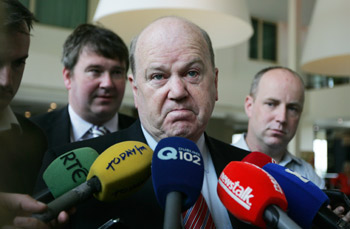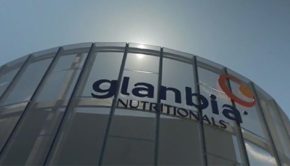Stand by for a pre-Christmas shocker

With the ESRI now calling for even more cutbacks, we can expect a pre-Christmas shocker when Michael Noonan delivers his first budget in three months
12 September 2011
Under the terms of last November’s EU/IMF bailout the government is committed to finding another €3.6bn of spending cuts and tax increases in 2012. This is the latest instalment of a strategy, which is supposed to reduce the budget deficit to 3% of GDP by 2015.
The government has further boxed itself in with its promise not to cut social welfare rates, increase personal or company tax rates, reverse the previous government’s cut in the minimum wage and honour the crazy Croke Park agreement.
Global economy slowing
Having given all of these hostages to fortune, framing next December’s budget was never going to be easy. Given a fair international wind the government might just have pulled it off. But now, just when the government desperately need some good external news, the global economy is slowing.
This means that the export sector, the one major good news story coming out of the Irish economy this year, will be hit as demand for Irish goods and services falls in overseas markets.
In the November 2010 four year plan, which underpins the EU/IMF bailout, the previous government proposed increasing tax revenues by €11bn and reducing the budget deficit to 3% of GNP by 2014, a target date since pushed out to 2015 by the new government.
Excessive optimism
Of this extra €11bn of tax revenues it was anticipated that E6bn would be generated by higher taxes and the remaining €5bn would be generated by economic growth. Even at the time the growth rates projected in the four year plan, average GDP growth of 2.8% for the four years to the end of 2014, were excessively optimistic.
Even before the latest bout of turmoil in the international financial markets various bodies including the EU Commission, the Central Bank and the ESRI had cut their 2011 and 2012 economic growth forecasts for Ireland.
If economic growth is lower than expected then the hoped-for boost to tax revenues will be correspondingly reduced. This in turn will force the government to impose even further politically painful spending cuts or tax increases if it is to meet the deficit reduction targets it has agreed with our creditors.
ESRI calls for more cuts
First out of the traps to acquaint our government with the even more unpleasant new economic realities was the ESRI. In its most recent quarterly economic commentary the government-supported economic think-tank has called for an even bigger reduction in the 2012 budget deficit than the €3.6bn which has already been pencilled in. The ESRI now reckons that Michael Noonan needs to produce a package of spending cuts and tax increases worth €4bn in next December’s budget.
So what would a €4bn budget day package actually look like? While the government is committed to increasing the standard VAT rate from 21% to 23% by 2015, the chronically-depressed state of retail sales almost certainly means that the government will stick to its original timetable of a 1% increase in the December 2012 budget followed by a further 1% increase in the December 2013 budget.
Where will the cuts come from?
So if a VAT increase is temporarily off the table where is the government going to get the money it needs? If we assume that the €4bn package is split roughly 2:1 between spending cuts and tax increases that means Michael Noonan needs to raise at least €1.3bn of extra tax revenue in 2012.
Top of the list will be the new household charge, essentially the first stage in the re-introduction of domestic rates. Even a €200 charge covering one million households would raise €200m while a €100 water charge would raise a further €100m.
That still leaves the exchequer at least €1bn short. In last December’s budget the government raised €860m (€1.15bn in a full year) through a combination of reducing tax credits and narrowing tax bands. Expect something similar this December.
Corporation tax options
Although the government has promised not to increase our 12.5% rate of corporation tax there is more than one way of skinning a cat. While the nominal rate of corporation tax is 12.5% the effective rate, the percentage of their profits that companies actually hand over to the taxman, is even lower.
How much lower? The truth is that we don’t know but there are some indications that the gap between the nominal and the effective corporation tax rate is a wide one. This year the Central Bank is forecasting that Irish GDP will be €156bn but that Irish GNP will be only €122bn. That €34bn gap is basically profits that have been repatriated by multinationals.
As against that the government is planning to raise just €4bn in revenue from corporation tax this year. When the non-repatriated profits of the multinationals and the profits earned by indigenous companies are added, it is clear that the effective tax rate being paid by Irish-based companies, both multinational and indigenous, falls well short of the 12.5% nominal rate.
Don’t be too surprised if the budget contains measures that, while leaving the 12.5% nominal rate untouched, increases the effective tax rate paid by most companies. This would have the twin benefits of raising extra revenue while at the same time getting the EU off our backs.
The good news
That’s the bad news. The good news is that, apart from a VAT rate increase being unlikely, most of the other indirect taxes will also probably be left unchanged. High oil prices make it difficult to significantly increase fuel duties while the strength of the euro against sterling probably rules out any hike in alcohol duties.
Of course, a further worsening of the eurozone crisis, possibly leading to Ireland’s ejection from the single currency, could leave the budgetary arithmetic looking very different. In an age of uncertainty, the only certainty is no certainty at all.



 Print
Print






Fans 0
Followers